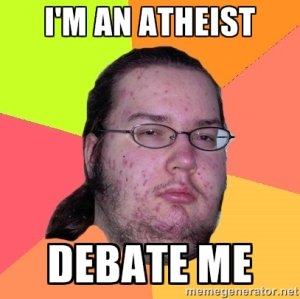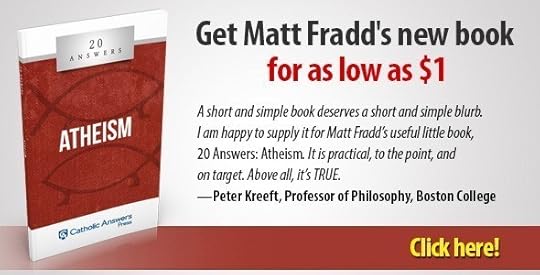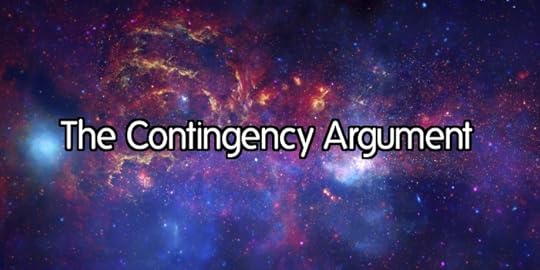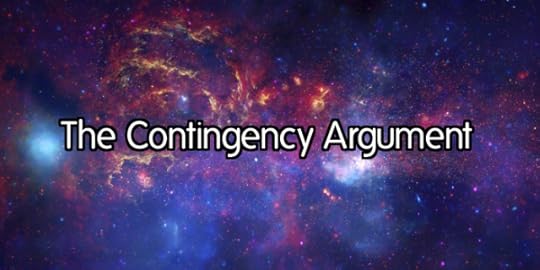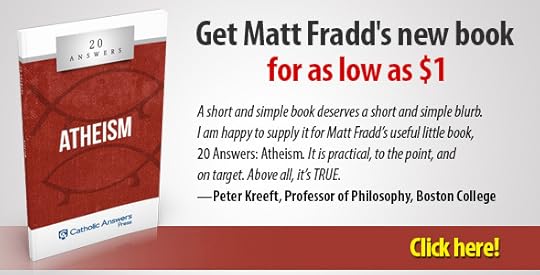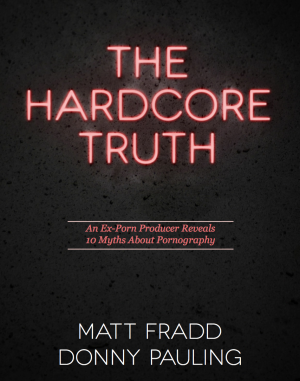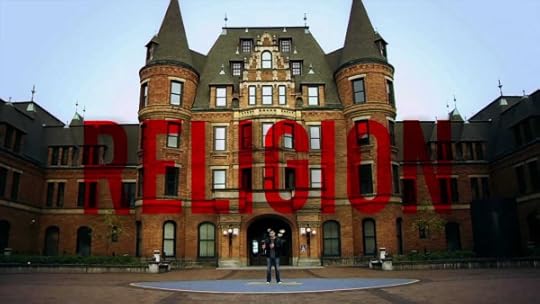Matt Fradd's Blog, page 56
June 17, 2014
What is Atheism? A Socratic Dialogue
Sarah: “I’m an atheist, debate me”? Cute/confrontational shirt, dude.
Brad: Yeah, got it online. Glad you like it.
Sarah: I’m Sarah.
Brad: Brad . . . Aaaaannnnd now I feel awkward ’cause you’re reading the Bible.
Sarah: Haha! Yeah, I come here for a Bible study once a week. It looks like I’ve been stood up.
Brad: Do you mind if I join you?
Sarah: I’m hesitant, given your ridiculous shirt, but sure.
Brad: Thanks. Look what I’m here to read!
Sarah: Wow! Dawkins. How original of you.
Brad: I could say the same about you—The Bible?
Sarah: touché.
. . .
Is this the part where you get all confrontational?
Brad: In it he says . . .
Sarah: I’ve read it.”
Brad: Really?
Sarah: Really. He’s as sophisticated an atheist as Ray Comfort is a Christian.
Brad: Them’s fightin’ words!
Sarah: Maybe I need a similar shirt.
Brad: Do you remember what he said about the God of the Old Testament?
Sarah: Yeah, but I have a hunch you’re gonna to read it to me anyway.
Brad: “The God of the Old Testament is arguably the most unpleasant character in all fiction: jealous and proud of it; a petty, unjust, unforgiving control-freak; a vindictive, bloodthirsty ethnic cleanser; a misogynistic, homophobic, racist, infanticidal, genocidal, filicidal, pestilential, megalomaniacal, sadomasochistic, capriciously malevolent bully.”
Sarah: It’s well written. Why are you an atheist?
Brad: Well, partly because . . . Let’s see here . . . “The God of the Old Testament is arguably the most unpleasant . . .”
Sarah: I get it, I get it.
Brad: You asked.
Sarah: How does that follow though?
Brad: How does what follow?
Sarah: This religion’s account of God is terrible, therefore God does not exist.
Brad: It’s not just that it’s terrible, it’s that it’s contradictory. In the Old Testament he’s a malevolent bully, in the New Testament he’s a peace loving hippie.
Sarah: Well, as formidable as you’re exegetical skills are, so what? Let’s say you’re right. Maybe the Bible is false.
Brad: I’m glad we agree. . . . My Latte’s ready. One sec. . . . Sorry about that. Continue.
Sarah: Seriously? The great atheist debater said yes to sprinkles.
Brad: Hey! Sprinkles are cool, okay? So, what were you saying?
Sarah: I was saying maybe the Bible is false. Obviously I don’t think that, but let’s suppose I’m wrong. How would that prove God doesn’t exist?
Brad: It’s not just the Bible, every formulation of God’s existence from every religion I’ve studied—and I’ve studied a lot!—amounts to nothing more than anthropomorphic twaddle.
Sarah: Okay. Let’s say you’re right. That’s hardly a good reason to think God does not exist. That would be like me saying, “I’ve studied the history of alien abductions. I have interviewed every living claimant, and have found all their stories to be bogus. Therefore aliens do not exist.” Do you see how that’s a non sequitur?
Brad: Sarah, I think it’s important to remember that you’re the one who has the burden of proof here. You’re the one who claims God exists.
Sarah: I agree I have a burden of proof, but so do you, unless you’re not an Atheist after all!
Brad: This is a common misconception. An atheist is not one who says God does not exist, he just lacks belief in the God you claim does.
Sarah: I’m not interested in what you believe.
Brad: Ouch?
Sarah: Look, what I mean is, If you’re going to redefine atheism to mean a “lack of belief,” then what you’re doing is trivializing what has traditionally been meant by “atheism.” This definition of yours would make atheism, not a belief, but a state of mind. And I’m not interested in your state of mind, I’m interested in what’s true.
Brad: It’s not a redefinition. That’s what we’ve always meant by it.
Sarah: See, I know enough to know that that isn’t true. I study philosophy, one of the standard encyclopedias of philosophy is The Routledge Encyclopedia of Philosophy. It says that, “Atheism is the position that affirms the non-existence of God. It proposes positive disbelief rather than mere suspension of belief.” What you’re talking about is Agnosticism, from the Greek word, agnostos, meaning “without knowledge.”
Brad: Look. I think that if I’ve made the sincere effort to discover the truth about something, and have found all the evidence in favor of that thing lacking then i’m justified in saying that that thing doesn’t exist. Besides, you’re an atheist with regards to every other god humanity has postulated. I just go one step further. I’m consistent.
Sarah: Okay, two points. Let me address the “you’re an atheist about other god’s” one first. You’re right, I don’t believe in Zeus, Thor, Horus, etc. but that doesn’t make me an atheist. An atheist is someone who doesn’t believe in God. I do believe in God, therefore I’m not an atheist. Do you think that monarchy is a good form of government?
Brad: No.
Sarah: What about a Kakistocracy, where the government is lead by the least qualified to govern. Do you think that is a good form of government?
Brad: Hmm. I thought that was what we were in now, No. No, I don’t think that is a good form of government; what’s your point?
Sarah: My point is, I’m no more an atheist because I reject some versions of god than you are an anarchist because you reject some forms of government. Now, your first point about having made a good effort to see if a thing is true. *Sigh* Now we’re going round in circles. Remember what I said about the aliens? Suppose I make a sincere effort to discover the truth about extraterrestrial life and find all the evidence in favor of it lacking. That doesn’t warrant the conclusion that aliens don’t exist. They may still exist even though we have no good evidence to think that they do.
Brad: What reasons do you have to think that he does?
Sarah: Wait a minute. Before we get to that we need finish defining our terms. Trent Horn, who wrote a book called Answering Atheism—you need to read it—says that since there are three ways in which a person can respond to the question, “does God exist?”—yes, no, or, maybe—It makes the most sense that we have three terms: If you say yes you’re a theist, if you say no, you’re an atheist and if you say maybe you’re an agnostic. If you want to say no, then that’s a claim to knowledge which you need to give reasons for.
Even one will do.
June 16, 2014
Contingency Argument for God’s Existence
Perhaps my favorite cosmological argument for the existence of God is the contingency argument. It goes like this:
Whatever exists that does not have to exist requires an explanation for its existence.
The physical universe does not have to exist.
Therefore, the universe requires an explanation in something that must exist.
God is the only being that must exist.
Therefore, God is the explanation for the existence of the universe.
The first premise of this argument reflects the human perception that there are reasons for the existence of the things we see around us. This is what drives science, as well as every other branch of study. It’s the great question: “Why?” This question applies to anything that doesn’t have to exist or that could be different from what it is (what philosophers sometimes refer to as “contingent” things).
For example, when astronomers discovered red- colored stars, they tried to explain their existence. To say that there isn’t an explanation—not that we don’t know it but that there actually isn’t one—strikes at the foundation of rational thought. It’s to reject the whole premise that underlies the quest for knowledge. The first premise of our argument thus seems secure.
So does the second premise. If we look around the physical universe, we see it filled with stars and galaxies. And we see that the things within it obey certain laws and those physical laws have certain constants, or unchanging values.
For example, the constant C in E=MC2 refers to the speed of light, or 186,000 miles per second. This fact about light never changes, and so it is called a constant. There are many other constants, such as the gravitational constant: Gravity is so strong and not stronger or weaker. We experience three dimensions of space and one of time, not more or less.
Why?
At one time the universe didn’t contain stars and galaxies. Why do those objects exist now when they clearly don’t have to? All of these matters are subjects of scientific inquiry, and they reveal that the physical universe as a whole is contingent. That is, the universe is one way but could be another, or it could simply not be at all. It there- fore needs a reason for its own existence—an explanation.
But let’s inquire a bit further and ask about what could explain the way the physical universe is. Whatever it is, it must be greater than the physical universe; it must be something beyond space and time, beyond matter and energy, but with the power to create each of these and to establish the laws that they obey. It would be something that explains its own existence and could not fail to exist.
Once again, that sounds a lot like God: what philosophers call a “necessary” being: God could not be different from what he is, which is what premise 3 states.
This is something our intuition also tells us. There must be an ultimate explanation, one that doesn’t de- pend on anything else, and thus one that explains everything else. There must be something fundamental, something that grounds all the contingent things we see around us. And thus there must be a God.
The Leibnizian Cosmological Argument
My favorite formulation of the contingency argument is by German mathematician and philosopher Gottfried Wilhelm von Leibniz. Here is an excellent video explaining and defending it:
My New Book
I have recently published book with Catholic Answers in which I respond to twenty common objections and questions posed by atheists. It’s a short book (about 70 pages) and therefore we’re able to sell them in bulk for as low as $1. Click the image below to buy your copy/copies.
June 12, 2014
The Contingency Argument for God’s Existence
Perhaps my favorite cosmological argument for the existence of God is the contingency argument. It goes like this:
Whatever exists that does not have to exist requires an explanation for its existence.
The physical universe does not have to exist.
Therefore, the universe requires an explanation insomething that must exist.
God is the only being that must exist.
Therefore, God is the explanation for the existenceof the universe.
The first premise of this argument reflects the human perception that there are reasons for the existence of the things we see around us. This is what drives science, as well as every other branch of study. It’s the great question: “Why?” This question applies to anything that doesn’t have to exist or that could be different from what it is (what philosophers sometimes refer to as “contingent” things).
For example, when astronomers discovered red- colored stars, they tried to explain their existence. To say that there isn’t an explanation—not that we don’t know it but that there actually isn’t one—strikes at the foundation of rational thought. It’s to reject the whole premise that underlies the quest for knowledge. The first premise of our argument thus seems secure.
So does the second premise. If we look around the physical universe, we see it filled with stars and galaxies. And we see that the things within it obey certain laws and those physical laws have certain constants, or unchanging values.
For example, the constant C in E=MC2 refers to the speed of light, or 186,000 miles per second. This fact about light never changes, and so it is called a constant. There are many other constants, such as the gravitational constant: Gravity is so strong and not stronger or weaker. We experience three dimensions of space and one of time, not more or less.
Why?
At one time the universe didn’t contain stars and galaxies. Why do those objects exist now when they clearly don’t have to? All of these matters are subjects of scientific inquiry, and they reveal that the physical universe as a whole is contingent. That is, the universe is one way but could be another, or it could simply not be at all. It there- fore needs a reason for its own existence—an explanation.
But let’s inquire a bit further and ask about what could explain the way the physical universe is. Whatever it is, it must be greater than the physical universe; it must be something beyond space and time, beyond matter and energy, but with the power to create each of these and to establish the laws that they obey. It would be something that explains its own existence and could not fail to exist.
Once again, that sounds a lot like God: what philosophers call a “necessary” being: God could not be different from what he is, which is what premise 3 states.
This is something our intuition also tells us. There must be an ultimate explanation, one that doesn’t de- pend on anything else, and thus one that explains everything else. There must be something fundamental, something that grounds all the contingent things we see around us. And thus there must be a God.
The Leibnizian Cosmological Argument
My favorite formulation of the contingency argument is by German mathematician and philosopher Gottfried Wilhelm von Leibniz. Here is an excellent video explaining and defending it:
My New Book
I have recently published book with Catholic Answers in which I respond to twenty common objections and questions posed by atheists. It’s a short book (about 70 pages) and therefore we’re able to sell them in bulk for as low as $1. Click the image below to buy your copy/copies.
9 Things People Are Saying About “The Hardcore Truth”
A couple weeks back we launched a free ebook that exposes 10 commonly held erroneous beliefs about pornography. The book was written by myself and former Playboy producer Donny Pauling.
I mined through some of the feedback we got and chose 9 quotations. I hope they will—if you haven’t yet downloaded the book—convince you to download it. And, if you have downloaded it, I hope these quotes will inspire you to share the link to where they can get the ebook: http://www.covenanteyes.com/thehardco...
The ebook is free, and will remain that way. We hope it helps you and those you love.
1. “I’m so thankful that you made it available for free! Thank you! For the past few weeks, I’ve been doing a Theology of the Body series with my youth group. Our final night, we discussed pornography. I was so thankful for your resources to prep me and my Core Team for the discussion that night.”
2. “When I heard that this ebook was free, I wasn’t expecting it to look so good! It’s really well laid out, easy to read, and the quotes and stats were a nice touch. Thanks.”
3. “The book is amazing! As a woman, yearning for love, I watched porn thinking I needed to be like the women on the videos for a man to love me. Little did I know that the women were as broken as I was.”
4. “It was formatted in such a way that questions I had were easy to find and answered in a straight-forward way. I didn’t get lost in the text – it was engaging and very informative.”
5. “I downloaded The Hardcore Truth as a resource to give our Stronger leaders and was surprised how easy a read it was, [it was painful to read, so] I won’t say I enjoyed it, but I can’t wait to share it as it was definitely compelling!”
6. “Though [The Hardcore Truth] was easy to read, I also found it difficult to read in a sense, because it was so real. The book truly was “hardcore truth.” And though information like that is upsetting, especially as I see its relation to those who are addicted in my own life, there is so much freedom in knowing the truth and seeing the lies with clarity.”
7. “I . . .thoroughly enjoy this book! It was really enlightening and very spiritually rewarding. I about two months ago I took an active role in my spiritual warfare against using pornography and masturbating. . . . [this] helped me so much.”
8. “Following our youth night (this past Sunday night), I emailed a link to the book to all of our teens, along with a link to your covenant eyes website. I’m so thankful that your websites and resources exist so that we can educate ourselves and help each other out of the toxic that is pornography.”
9. “I found the book really interesting and moving….since i work in youth ministry it’d really help me …..thank you very much….God bless u…”
Google Stops Porn Ads!
In 2014, Morality in Media put Google (yep, just linked to Google . . . Wonder if that’s ever been done before) on their Dirty Dozen List. A list which names twelve leading contributors of sexual exploitation.
Why Google specifically? They write:
Google is a dominant force in technology. More than 1.1 billion people use Google search each month.
Google’s Android operating system is on 79% of smartphones and Google’s digital advertising revenue was $38.6 billion in 2013.
With all of this, it is strange to think that Google is in the business of pornography. Although their policies somewhat prohibit pornography and/or sexually explicit content on most of their products, both forms of content can be found throughout Google YouTube, Google Play, Google AdWords, Google Images and Google Search.
This got Google’s attention, and last month a meeting was held with Morality in Media, other anti-porn activists (including my boss from Covenant Eyes, Scott McClurg—Woot! There he is. Down there. Second from the left. #LikeABoss—literally! *COUGHgivemearaise.*) and Google executives at their offices in Washington, D.C.
Two weeks after that meeting, Google made this announcement AdWord clients in violation of the new anti-porn policy:
Beginning in the coming weeks, we’ll no longer accept ads that promote graphic depictions of sexual acts including, but not limited to, hardcore pornography; graphic sexual acts including sex acts such as masturbation; genital, anal, and oral sexual activity.
When we make this change, Google will disapprove all ads and sites that are identified as being in violation of our revised policy. Our system identified your account as potentially affected by this policy change. We ask that you make any necessary changes to your ads and sites to comply so that your campaigns can continue to run.
Oh, and one more awesome piece of news. Google has also put the kibosh on all sexually explicit apps on Google Play (Google’s phone app store).
You better believe that there are a whole lot of powerful websites out there that are less than pleased at Google’s decision to protect children and families from their degrading smut. Click here to thank Google for their positive changes. I just did it and it took less than 10 seconds.
June 10, 2014
My Interview with Audrey Assad on Female Porn Addiction
Audrey contributed her story to my new book, Delivered, of having once been hooked on porn as a young woman and then, later, by God’s grace, finding hope and healing.
We recently shot some emails back and forth on the topic of female porn addiction.
Oh, and for those of you who have not yet heard of Audrey Assad . . . Buckle up!
Right? Check out her site!
Here’s our interview. We’d love to hear your feedback!
Matt: Audrey, on a scale from 1 to stepping on lego barefoot, how much does it hurt you when you hear someone say, “girls don’t struggle with porn. Porn is a guy’s issue.”
Audrey: It’s certainly a little stab to my heart when I overhear something like that, especially when it’s spoken from a platform. Whenever I heard this as a teenager it isolated me even more in my battle against pornography addiction, because it reinforced my assumption that I should never tell anyone about it.
I thought that I was the only woman in the world going through it—and this was Satan’s greatest foothold in my heart and mind while I was in bondage to pornography.
As long as I thought I couldn’t tell anyone, it was virtually impossible for me to experience deliverance.
Hearing things like this from the platform of ministry only reinforced the deception.
Matt: I know you’ve had the opportunity to share your story of porn addiction and recovery with young women all over the country. What’s their reaction?
Audrey: It’s pretty incredible how many girls will share the truth about their addictions with you if you just speak up about yours.
A few years back I spoke at a conference for high-school students and shared (briefly) my testimony at a girls’ session; and then for the rest of the week girl after girl pulled me aside to share that she was battling pornography addiction.
I probably talked to fifty girls. And their youth leaders were pulling me aside as well–some to share their own struggles and some telling me about their uncertainty about what to do with the students who had suddenly been confessing to them. One told me that a girl in her group shared that she’d been compulsively viewing pornography since the age of eight.
It’s a lot more common than anyone would like to believe, and the sooner we learn how to address it, the sooner more and more young women can find freedom in community.
Matt: What three things would you recommend to a woman struggling with porn who may be reading this?
Audrey: I’d recommend confession first: whether you’re Catholic or Protestant, speaking your sins aloud to someone you trust is the surest way to begin to confront them, and then to walk away from them.
Secondly, accountability: pick several people in your life (probably of your same gender, unless you’re choosing your brother or your dad) who know you well and who don’t judge you for your sins, but who care enough about you to hold you accountable to what you are attempting to do.
Thirdly, counseling: pornography feeds on what is, deep-down, a good and innocent need—the need for intimacy, for love, and for affection. Most often when someone is addicted to pornography, the foothold of the enemy is to warp and twist those natural, God-given needs and desires. A good counselor can help you unravel the spiritual and emotional reasons those needs and desires are being preyed on, and help you develop healthy ways to meet those needs at your stage in life and in your state in life.
Matt: Thanks for your time, and thanks again for contributing to the new book!

June 3, 2014
What’s Adult About “Adult Entertainment”?
Pornography is, no doubt, a form of entertainment. But what are we to make of the protest of porn advocates that pornography is “adult entertainment.” What is it that they mean? I think they mean either a) pornography is not for children. or b) pornography is adult entertainment in that it is appreciated by the sophisticated—like blue cheese, good scotch, and Dostoyevsky. Perhaps they mean both. Either way, let’s address each point:
Pornography is not for children
If this is all that porn advocates mean, then fine; I agree. But if this is meant to be an argument for the legitimacy of the adult use of pornography, it’s hopeless. That would be like arguing that since racism, heroine, bigotry, and mockery of the poor are not for children, that it therefore follows that they are for adults. Certainly it would be less disturbing to see these actions in an adult than a child but that doesn’t mean they’re not disturbing actions for an adult to commit.
Pornography is sophisticated entertainment
Seriously? What exactly is sophisticated about porn? The acting? The script? The man who sneaks away from his wife late at night to get a “fix” from his iPhone?
It says “Adult”
Yes, strip clubs and porn stores have large, often flashing, neon signs that say “adult” or “gentlemen’s club.” But, doesn’t this seem a tad defensive? I can imagine the following conversation taking place between two co-owners of a strip club:
Erk: They’re saying that what we’re doing is immoral.
Bob: Immoral?
Erk: Yeah! That “real men don’t go to strip clubs.”
Bob: The nerve!
Erk: How can get across the fact—that you and I both realize—that paying women money to pretend to like you is totally manly?
Bob: Huge neon sign that says “Manly”?
Erk: Nah, too blatant.
Bob: “Gentlemen’s Club”?
Erk: Bloody brilliant!
Actions speak louder than words; even when those words are five feet high, neon, and constitute the phrase “gentlemen’s club.” It seems to me that the attempt to make sexual deviancy appear gentlemanly was nothing more than the attempt of weak men to justify shameful behavior; and I think deep down we all know this. I think deep down even porn stores realize this! The back entrances and covered windows have more to do with their noble desire to safe-guard the innocence of children.
So, in my humble opinion, it seems that, despite the porn industry’s protestations to the contrary, “adult entertainment” is very efficient means of making those who buy into it increasingly juvenile.
What are your thoughts?
The Apologetics Mansion: Making the case for Catholicism
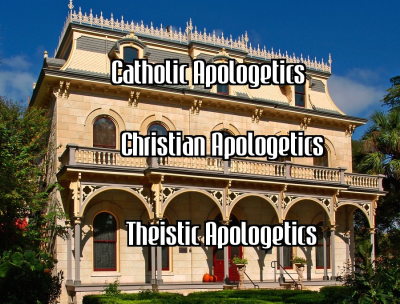
How to build the case for the truth of Catholicism
The following article is one which I wrote for Catholic Answers Magazine. It’s completely unfriendly looking to the average blog-reader (nearly 4000 words!). I do, however, think that it’s good, and I hope you’ll find it worth your time.
John 14:2 says, “In my Father’s house are many rooms; if it were not so, would I have told you that I go to prepare a place for you?”
In some Bible translations, such as the King James Version, the word for “rooms” is “mansions” in order to translate the Greek word monai. “Mansions” isn’t the best word to use, since it seems odd that a single house could have many “mansions” inside of it (though when it comes to God’s house, we might make an exception!).
Regardless, I still enjoy the imagery behind the verse and love to think that God has called me to relationship with him and has prepared an eternity for me, which is better than any 4,000-square-foot house on Earth.
But since God desires all men to be saved (1 Tim. 2:4), we have to do our part in helping other people draw near to God. Ultimately, God is the one who converts hearts and imparts faith, but he has trusted us as his “ambassadors” (2 Cor. 5:20) to help him with his task. In this article I’d like to outline my preferred method for helping someone come to see that the Catholic Faith is true.
It seems to me that building a case for the Faith is a lot like building a house, a mansion, one floor at a time. Those outside the mansion, in our thought experiment, would be atheists; those on the first floor, theists who believe in a generic god; those on the second floor, theists who believe in the Christian God; and finally those on the third floor would be theists who believe in the Christian God and the truth claims of the Catholic Church.
Our goal as Catholic apologists is to lead others out of the darkness of unbelief to the summit of the mansion, the Catholic Church, which contains the fullness of truth.
Let’s examine this mansion from the ground up, starting with the foundation.
The foundation: Logic and reason
When someone wants to build a house, he might daydream about how the master bedroom will look. What most people don’t spend their time thinking about is the foundation of the house. Sure, concrete and steel rebar aren’t the most glamorous parts of our apologetics mansion, but they are the most important parts. Jesus himself admitted that any building project needs a solid foundation lest it crumble to the ground (Matt. 7:24-27).
So what is the foundation of our “mansion”? Prayer and logic. We need logic because we need to know how to use reason to demonstrate that our Faith is true. Logic also helps us, in the words of Paul, “destroy to Christ” (2 Cor. 10:5). This includes arguments that are used to try and disprove our Faith. We can show how these arguments commit fallacies, or errors in logic, and as a result these arguments fail to prove their anti-faith conclusions.
Sometimes Christians shy away from arguments, saying things like, “We shouldn’t argue with people but simply share our story.” This, it seems to me, is wrongheaded. Arguing isn’t the same thing as bickering or fighting. It is possible to argue without being argumentative (Paul did it: Acts 17:1, 17). Arguing, then, is simply the process of giving reasons to think a certain proposition to be true.
But while logic and argumentation are important, even more important is having a real relationship with the God we are defending. Catholic author Jon Leonetti says, “When your faith no longer includes prayer, it becomes a hobby.” Indeed, some of the most vocal critics of God or the Catholic Church are former apologists.
I fear that in some of these cases these apologists became so enamored of their ability to defend the faith that they trust- ed too much in their own abilities and lost sight of trusting in God. As a result, when they fail intellectually or morally they lose faith in themselves (which was the person they really had faith in when they stopped praying) and abandon their faith.
Now that we’ve seen how important prayer is to the life of an apologist, you’re ready to learn how logic is our next best friend. In my DVD “How to Win an Argument Without Losing a Soul,” I give around ten examples of common illogical arguments people make against our Faith.
Let’s look at one of the most common: the fallacy of self-referential incoherence. I know that can be an intimating term, but it’s actually quite simple. This fallacy happens when someone makes an argument that refutes itself. Consider some of the following arguments you might hear when you try to stand up for your faith:
“You shouldn’t push your beliefs on other people!”
“You have no right to judge me!”
“No one knows the truth, and it’s arrogant to say you’re right and everyone else is wrong.”
Notice that all of these arguments refute themselves. The person who says, “You shouldn’t push your beliefs on other people” is actually pushing his belief that you shouldn’t push your beliefs on other people. If someone accuses you of being judgmental, remind him that by saying so he is judging you.
Finally, to say “No one knows the truth” is contradictory, because it assumes that the speaker knows the truth that “no one knows the truth.” He also believes that anyone who disagrees with him and claims to “know the truth” is wrong, even though what he says implies logically that we should not say, “I’m right and you’re wrong.”
The ground floor: Theistic apologetics
Now that we’ve laid a foundation grounded in logic and prayer, it’s time to build the next floor of our apologetics mansion.
So what is the primary truth of our faith? The first paragraph of the Catechism of the Catholic Church begins bysaying, “God, infinitely perfect and blessed in himself, in a plan of sheer goodness freely created man to make him share in his own blessed life.”
I’ve seen many cases of people debating the Catholic Faith with nonbelievers without appreciating this basic approach: “Meet other people where they are at.” If an atheist attacks the Eucharist as being a cannibalistic superstition, it’s somewhat fruitless to walk him through an exegesis of John 6, because he doesn’t even believe God became man to give his body as food for the world. He doesn’t believe there is a God at all!
Attempting to convince an atheist about the truth of the Resurrection (or the Eucharist, the Assumption of Mary, and so forth) is like trying to teach advanced algebra to someone who denies basic arithmetic. Again, we should meet people where they are at—in this case, the ground floor—and lead them, reason with them, from there.
The fact is that many aspects of our faith that we find easy to believe do become absurd if God did not exist. Take, for example, the Resurrection of Christ. An atheist might say that it is ridiculous to believe that a dead body can come back to life when the uniform experience of the human race is that when people die, they stay dead. When the Catholic points out “five hundred people saw the risen Lord”
(1 Cor. 15:6), the atheist is more likely to accept any other natural explanation.
For example, he might argue those ac- counts are legends or hallucination. He might even claim (and I have heard this!) that Jesus was actually a space alien and fooled everyone into thinking he was God. He might cling to any explanation other than a miracle, because to him miracles can’t happen, since there’s no God to cause the miracle.
A better response is to admit to the atheist, yes, a dead person coming back to life is pretty absurd. Any naturalistic explanation is probably better than saying a dead person has risen from his grave. But I as a Catholic am not claiming that. I’m saying that God raised Jesus from the dead, so that isn’t absurd, because God is omnipotent. If God exists and Jesus can plausibly be seen to have a special relationship with God (which is well-attested in the Gospels), then the accounts of Jesus’ Resurrection are not of a bizarre, freak occurrence but are vindication of Jesus’ claims to divinity that are seen throughout the New Testament.
So now, instead of debating the occurrence of miracles in the Bible or Church history, you can center the discussion on the “ground floor.” Is there a God who could perform these miracles and make them more likely to have occurred? Once we’ve established that framework, then we are in a far better position to deter- mine which religion, if any, is true.
If you want to learn how to build this floor of the mansion, I recommend Trent Horn’s newest book, Answering Atheism: How to Make the Case for God with Logic and Charity. Or my new little book, 20 Answers to Atheism which responds to twenty common objections and questions from atheists.
The second floor: Christian apologetics
Well, the first floor looks nice. It’s got a spacious dining area, a parlor room,
maybe a bowling alley (hey, this is a mansion after all). But our mansion would be missing a lot if it had only this first floor, just as our faith would be missing a lot if it possessed a belief only in a generic “God of the philosophers.” We have to go upstairs to the next step in our journey, which is the revelation of God in the person of Jesus Christ.
Even if you can show an atheist that it is reasonable to believe God exists, he might shrug his shoulders and say, “All right, there’s a god. But what does thathave to do with my life?” However, if God has revealed himself to mankind and extended an offer of salvation from sin, then that has a lot to do with our lives!
“But lots of religions claim to be ‘inspired by God.’ How do we know which one to follow?” says our skeptical friend. Here is where we can put on our “historian hardhat” as we build the hallways and doors of the second floor of the mansion. In this step we show that the Christian faith is unique, because there is good evidence that Jesus of Nazareth lived, died,was seen alive by both followers and skeptics after his death, and that those people died for their belief in Jesus’ Resurrection and divinity.
One might respond, “But don’t other religions have similar miracle claims that make what people claimed about Jesus less special?” Actually, most other religions don’t or can’t make these claims. For example, the miracles associated with Buddha were recorded nearly four hundred years after his death, which gives ample time for legend to soil the historical record. In contrast, the Resurrection of Christ is recorded in Paul’s letter to the Corinthians, which was written only twenty years after Jesus’ death. The creed describing the Resurrection in 1 Corinthians 15 is even older, dating back to within five years of the Resurrection itself. This just isn’t enough time for leg- end to replace history.
Other religions don’t even have miracles to back up their claims. The Quran, which is the holy book of Islam, does not describe the prophet Muhammad per- forming any miracles. Sura 10:13 states, “And the Unbelievers say: ‘Why is not a sign sent down to him from his Lord?’ But thou art truly a warner, and to every people a guide.” Muhammad merely served as a “warner” or “guide” who would lead people to belief in God. Most Muslims try to argue that the beauty of the Quran itself is the “miracle” that proves their faith is true; but just because something is beautiful doesn’t mean it’s a miracle.
This focus on the core historical vindication of our Faith can also be helpful when you are talking with skeptics who are fixated on parts of the Bible they disagree with, such as the Bible’s depiction of slavery or God’s orders to slaughter the Canaanites in the Old Testament. Once I was in a conversation with a person like that, and I simply said, “All right, let’s say I didn’t know how to explain these difficult parts of the Bible. I think there’s good evidence Christ rose from the dead, and he trusted the Bible. If a man can walk out of his own tomb, then why shouldn’t I believe in what he believed in?”
If a person does not believe in the gospel message, then it’s easy for him to become fixated on so-called “Bible difficulties.” But if he has a relationship with Christ, then it can become much easier for him to see how God’s word, even when it is confusing, ultimately find its fulfillment in the revelation of Christ.
The third floor: Catholic apologetics
Let’s now move to the third floor. If our home started with a basic belief in God, and then progressed to trusting Jesus Christ was the unique Son of God, the next logical step is to trust in the Church that Christ founded.
Notice how our presentation of the faith ascends like a staircase. This approach is able to meet a person exactly where he his in his spiritual journey. For people who doubt that any religion can be true, we need to walk them around the logical foundation of the house (not yell at them about hell from the second or third floor). For those who are open to truth, we must see if they believe in a God who created the world and, if not, we must show them the first floor. Since the majority of nonreligious people believe in God (only two to five percent of the population is atheist), we usually have to help the nonreligious see that Jesus was not just a first-century hippie who preached, “Love your neighbor, man” but was instead God incarnate who takes away the sins of the world.
Once the person sees that Jesus is important and we should be a part of Jesus’ Church, we are now in a position to present him with the case for the Catholic Church. When you present the Catholic Faith to Protestant Christians, the most likely objection you will hear is, “Where is that in the Bible?” Where in my King James Bible [you know, the one where Jesus’ words are highlighted in red text and has all the neat thees and thous?] is purgatory, the Mass, the Assumption and Immaculate Conception of Mary, or the pope?”
Instead of rattling off biblical verses that support each of these doctrines (which, to be sure, has its place), try meeting people where they are and return to the second floor of the mansion. Ask them, “How do you know that everything we believe must be explicitly taught in the Bible?” Or, “Why should I believe that the Bible is even the word of God? Just because it says it is no more proves the Bible is the word of God any more than the Quran saying it is the word of God proves it is the word of God.”
While we’re at the second floor of the mansion, we can use an argument for the Catholic Faith made popular in Karl Keating’s book Catholicism and Fundamentalism. It goes like this: We can know from historical investigation that Jesus existed, selected apostles to form a church, rose from the dead, and com- missioned those apostles to evangelize the entire world. Since we have good historical evidence that Christ founded upon Peter and the apostles what we now know as the Catholic Church, we can have confidence in the Church’s authority to not only interpret Scripture but to recognize which books of the Bible are inspired and which are not.
Every other method proposed by Protestants to resolve this puzzle has come up empty-handed or self-defeating (to learn more about this approach to defending the Catholic Faith, you should also check out Devin Rose’s new book, The Protestant’s Dilemma: How the Reformation’s Shocking Consequences Point to the Truth of Catholicism.
Now, instead of arguing about whether certain Catholic beliefs or practices are biblical, you can center the discussion on the most important question: “Who has the authority to determine Christian doc- trine and practice (including the nature and interpretation of the Bible) in the first place?” Once you’ve resolved this issue, you can walk up the steps and show your guests how the third floor of the mansion is the natural outgrowth of the revelation seen in both the Old and New Testaments.
The attic
Now that we’ve reached the third floor of this apologetics mansion, there’s still one more part of the house we need to construct: the attic. But what goes up there? Not the odds and ends you can’t fit in a normal house but some of the most precious teachings the Church has given us: its teachings on morality.
The principle of meeting people where they are comes up most often when we are trying to defend the Catholic view of morality in the public square. An atheist, or even a Protestant who relies on the “Bible alone” to guide his worldview, may be dumbfounded that the Church prohibits things like contraception, in vi- tro fertilization, or homosexual behavior.
The atheist may say these things cause no real harm and therefore he be- lieves they are not wrong. The Protestant may say the first two are not prohibited in the Bible, so there is nothing wrong with them. He might even try to argue that the last item is not really prohibited in the Bible but that the Bible only condemns unloving same-sex behavior in things like pagan temple worship, not modern, “loving,” same-sex relationships.
They have these reactions because their worldview is not built up with the structure you see in our mansion: Logic – God – Christ – his Church. Your mission is to meet each of these people where they are and help them see why the Church’s teachings on morality make sense.
If someone respects only the foun- dation of the mansion, you might have to start there. Romans 2:14-15 says that the law of God is written on the hearts of men, so even if they don’t know God, they know his moral demands.
Most people, even if they are not re- ligious, have an internal sense of right and wrong. For some moral issues, like abortion, you can make a case that relies on commonly held logical truths such as “It’s wrong to kill innocent human be- ings” and then back that up with scientific evidence for the humanity of unborn children. The principle of natural law can also explain why other acts against the natural order, such as sterilizing pro- creative acts through contraceptives or using the sexual organs in a way they weren’t designed to be used, are wrong.
But if the person is unresponsive to these natural-law arguments, or the issue is one God revealed to man through special revelation, then you’ll have to assure the listener that these moral teachings make sense if they are “higher up in the mansion.” The Church’s prohibition on contraception, for example, makes more sense to a Christian who believes God has a plan for sexual union and procreation then to an atheist who denies sex is “for” anything.
Ready to move in?
As you can see, showing the Catholic Faith is true should never be boiled down to a sound bite like “Two thousand years of tradition can’t be wrong” or to an emotional plea like “The Catholic Faith has really made me happy, and it can make you happy, too.” There is a time for showing how the Church has outlived its historical threats, as well as a place for personal testimonies of how God has changed our lives. But we should always keep them in the context of building up the Faith for someone one step or one floor at a time, always being ready to meet them where they are with sound answers for their honest questions.
May 29, 2014
The Hardcore Truth – 100 Book Giveaway!
In 48 hours 100 people will win a free copy of my new ebook, The Hardcore Truth: An Ex-Porn Producer Reveals 10 Myths About Pornography.
For the past few years, former Playboy producer Donny Pauling and I have been traveling the country (and beyond, a.k.a Canada) to university campuses, conferences—and even one punk bar—talking about the reality behind the fantasy of porn.
We decided that, instead of printing and shipping books to those events—which costs money— we (with the help of the awesome folks at Covenant Eyes) would create an attractive ebook for people to download via their phones immediately after our conferences.
This is that ebook.
In The Hardcore Truth we discuss some of the most common myths surrounding pornography:
Is porn is truly “glamorous”? Does it liberate women? Is it just healthy, adult entertainment? Does porn enhance sexual intimacy? And so forth.
You—if you’re one of 100 lucky ducks to win the raffle—will be sent a link to our new ebook this Saturday. Wha-what! You heard (read?) me!
Enter the raffle below, and please help us spread the word!
May 23, 2014
Jesus Came to Abolish Religion? A Socratic Dialogue
Sam: It’s not about religion, it’s about a relationship.
Justin: What do you mean when you say “religion?”
Sam: Mindless observance; superstitious acts of piety; following the rules.
Justin: Well, if that’s what you mean by religion, then I agree with you. I can’t think of anyone who would disagree with you! What do you mean by “following the rules?”
Sam: Thinking that unless you do such and such, God will be angry with you or something.
Justin: I believe—and I hope you believe too—that God’s love is unconditional. He loves us perfectly on our worst day.
Sam: Amen!
Justin: So what you’re saying isn’t that we shouldn’t follow the rules—by which I mean God’s commands—just that it’s better if our desire to follow them springs from our relationship with Christ as opposed to fear of punishment?
Sam: Precisely.
Justin: I agree. Incidentally, now that I understand what you mean when you say “religion,” where are you getting that definition? I don’t find it in the Bible.
Sam: Don’t you recall what Jesus said to the religious people of his day? Check out Matthew 12:38 where he calls the pharisees and scribes “You brood of vipers, how can you who are evil say anything good?” He doesn’t sound like a friend of religion to me.
Justin: Is he calling religion a “brood of vipers”? Or those he was speaking to?
Sam: Those he was speaking to . . . who were religious. He’s bashing religion by association.
Justin: He’s “bashing” religion by association . . . Hmm. Do you know what the fallacy of association is?
Sam: nope.
Justin: Funny, because you’re doing a terrific job at committing it. It’s attempts, to show that the qualities of one thing are inherently qualities of another, merely by an irrelevant association. [1]
In other words:
1. A is a B
2. A is also a C
3. Therefore, All B’s are C’s
That would be like arguing John is a Lutheran, John has a lisp, therefore, all Lutherans have lisps.
Sam: I’m almost certain that that’s not what I’m saying but continue.
Justin: It’s just, when I read the Scriptures, I don’t see religion being defined the way you’re defining it. Check out James 1:26, “If any one thinks he is religious, and does not bridle his tongue but deceives his heart, this man’s religion is vain.” Notice James doesn’t say, “if anyone doesn’t bridle his tongue but deceives his heart he is religious!” He’s distinguishing true religion which he thinks is a good from false religion. He even says as much in the next verse.
Have a look. Verse 27 says “Religion that is pure and undefiled before God and the Father is this: to visit orphans and widows in their affliction, and to keep oneself unstained from the world.” So you see, James seems to think that there is a religion that is pure and undefiled.
Sam: Doesn’t it say in the Bible, I forget where; I know, I may as well be a Catholic, right? But doesn’t it say, “What if I told you Jesus came to abolish religion?” I think that was the prophet Jefferson? or something like that.
Justin: I’m pretty sure that was a crappy YouTube clip.
Sam: Nooo. Was it?
Justin: Yep.
Sam: But look at the evil religious people have caused throughout the centuries.
Justin: COUGHfallacyofassociation
Sam: What was that?
Justin: Oh, I just coughed at the same time that I said “fallacy of association”
Sam: I know. Why?
Justin: Because I wanted to pretend like I didn’t want you to hear it. But I did want you to hear it.
Sam: Why?
Justin: I don’t know why I do the things I do, Sam. Put it down to me being religious if you like.
See my other Socratic dialogues here.
Matt Fradd's Blog
- Matt Fradd's profile
- 168 followers


